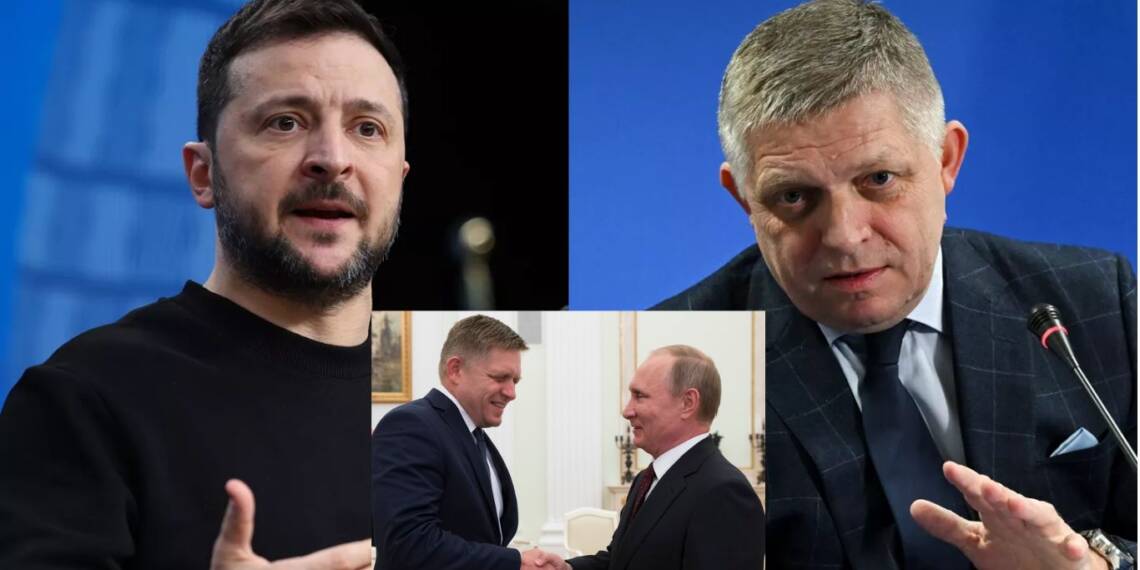In a decisive move, Slovakia has resumed imports of Russian gas via the TurkStream pipeline. The development comes after Ukraine had decided to halt Russian gas transit through its territory. Slovakia Prime Minister Robert Fico has been extremely critical of Ukraine and Zelensky’s moves to block the Russian gas supply to his nation.
Understandably looking at the needs of his populace Fico has gone ahead with an alternate plan. According to Slovak news agency TASR, the Slovak state-owned gas company, Slovenský plynárenský priemysel (SPP), plans to double these imports by April. SPP Chairman Vojtech Ferencz confirmed that the company maintains an existing contract with Russia’s Gazprom and mentioned the cost benefits due to lower transit fees.
The gas now reaches Slovakia through Turkey and Hungary, avoiding Ukraine entirely. Despite this, SPP’s trade division head, Michal Lalik, acknowledged that Slovakia still requires additional imports from alternative routes, including via Germany through Czechia. The country’s gas needs in January were primarily met using domestic reserves, which remain above average. However, the rising gas prices—currently exceeding €53 per megawatt-hour (MWh), compared to around €40/MWh before Ukraine halted Russian gas transit—pose a growing challenge. If the price remains high, the economic situation might worsen, as it happened in Germany and Fico remains extremely mindful of that.
The Ukraine-Slovakia Dispute
Ukraine’s refusal to renew the pre-war agreement allowing Russian gas transit to Europe, which expired on January 1, was a key factor behind Slovakia’s current predicament. Ukrainian President Volodymyr Zelensky justified the decision as part of efforts to cut off Russian revenue streams that fund its full-scale invasion of Ukraine.
This move was welcomed by Poland and the European Commission, which argued that the EU had prepared for such disruptions and could cope with the change. However, Slovakia, which heavily relies on Russian energy, was majorly affected. This kind of appeasement from the European Nations puts common citizens at economic risk. The absence of Russian Gas in European markets is creating problems for businesses and households, which European leaders are well aware of more so as there are nations that want to put the interests of their populace of international politics.
Also Read: Sanctions Backfire: EU faces 1 trillion dollar loss after cutting Russian gas
Slovak Prime Minister Robert Fico, a longtime critic of EU sanctions against Russia, reacted sharply. He accused Ukraine of “sabotage,” emphasizing that Slovakia stands to lose an estimated €500 million in transit fees. Fico, who visited Moscow in December 2024 to negotiate gas supplies with Russian President Vladimir Putin, warned that his government might respond by limiting aid to Ukrainian refugees and cutting electricity exports to Ukraine. As of late 2024, Slovakia hosted approximately 130,530 Ukrainian refugees, according to the UNHCR.
Ramifications for Fico
Fico’s response to Ukraine’s decision has sparked domestic protests. Nevertheless, The Slovak Prime Minister has always been against Western actions against Russia, labelling EU sanctions as “nonsensical” and “ineffective.” His position finds resonance among pockets of the Slovak people who hold anti-American sentiments, primarily based on past resentment over NATO’s 1999 bombing of Yugoslavia and the Iraq War.
In addition, Slovakia’s vulnerable three-party coalition government is under mounting pressure from growing energy prices and the possible economic consequences of losing gas transit revenues. Companies worry about gas shortages in the summer, as EU countries must fill their storage facilities to comply with a European Commission directive ensuring adequate reserves for the next heating season.
The Geopolitical Landscape
Fico is joined by Hungarian Prime Minister Viktor Orbán, another EU politician close to Moscow, in criticizing Ukraine’s move. Both leaders maintain that energy security comes before political considerations. Poland’s approach is the opposite, as Poland has said it will do its best to assist Ukraine if Slovakia carries out a threat to reduce electricity exports.
Although Slovakia has been able to acquire alternative gas supplies, the long-term effects are unclear. The TurkStream pipeline, 930 kilometres long under the Black Sea from Russia to Turkey, is a vital lifeline. But it is limited in capacity, and its use could leave Slovakia vulnerable to future geopolitical threats, particularly in light of EU initiatives to diminish reliance on Russian energy.
Slovakia’s decision to resume Russian gas imports via TurkStream highlights the country’s ongoing energy security challenges and deepening rift with Ukraine. The situation underscores the broader geopolitical tensions in Europe, where energy policy remains entangled with political alliances and economic interests. As the EU continues its efforts to diversify energy supplies, Slovakia decided to be pragmatic and secure energy supplies from Russia. Securing energy to reduce costs and keeping inflation in control looks more important for Slovakia’s PM Fico than showcasing some artificial solidarity that will hurt his own nation.








